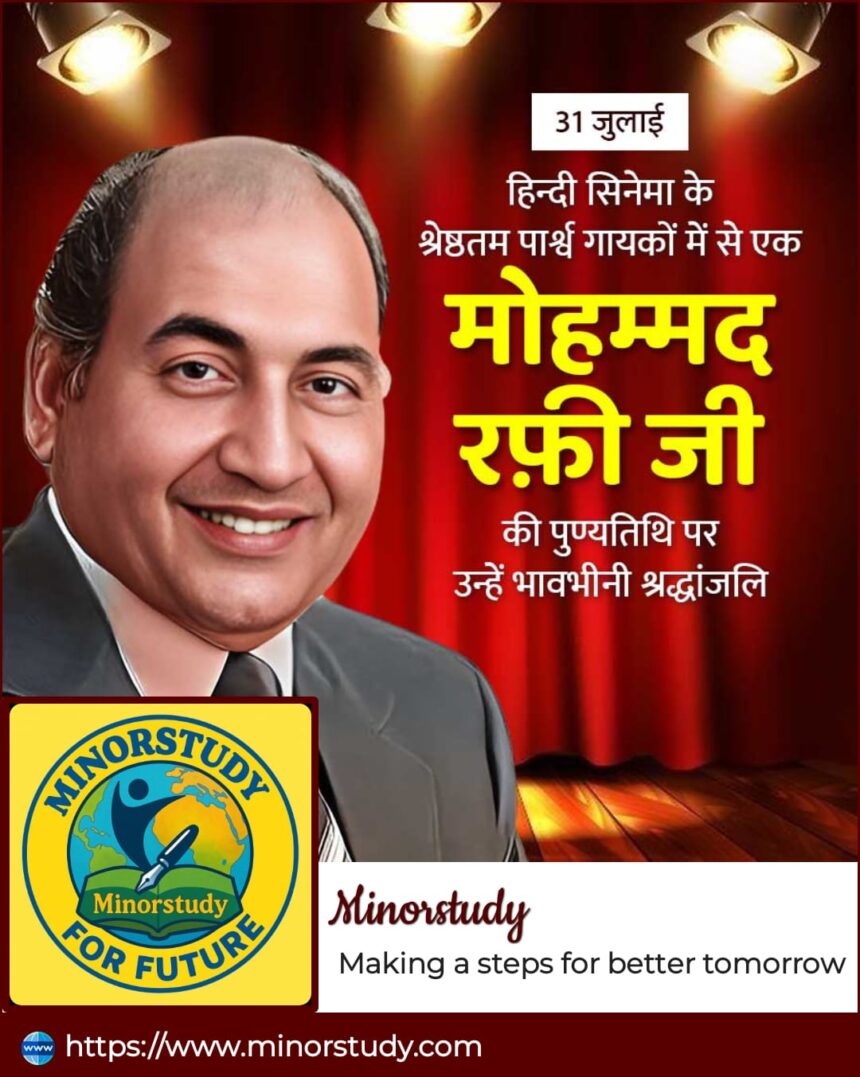🎤 Introduction – A Voice that Touched Millions
In the vast and vibrant history of Indian music, Mohammad Rafi Ji stands as a divine voice that transcended generations. Known for his unmatched versatility, humility, and divine tone, Rafi Saab wasn’t just a singer—he was an emotion, a memory, and a musical revolution.
- 🧬 History of Mohammad Rafi Ji – From Kotla Sultan Singh to Global Fame
- 🗓️ Timeline of Key Events in Rafi Ji’s Life
- 🎶 10 Incredible Facts About Mohammad Rafi Ji
- 📖 FAQs About Mohammad Rafi Ji
- 🌈 Significance of Mohammad Rafi Ji in Indian Culture
- 🎊 Observance – Celebrating Rafi Ji’s Legacy
- 🎂 Wishing Note – A Tribute from the Heart
- 🧭 Importance in Life and Society
- 💡 Important Life Lessons from Rafi Ji
- 🧘 Daily Life Impact – Why Rafi Ji Still Matters Today
- 🪔 Conclusion – The Eternal Voice of India
Whether it was romance, devotion, sorrow, patriotism, or mischief—Rafi Ji’s voice could breathe life into every emotion. His songs remain alive even decades after his passing, whispered through the radios, remembered in concerts, and sung by millions across the globe.
🧬 History of Mohammad Rafi Ji – From Kotla Sultan Singh to Global Fame
Birth: December 24, 1924, in Kotla Sultan Singh, a village near Amritsar, Punjab.
Full Name: Mohammad Rafi
Early Exposure: Inspired by a wandering fakir who used to sing outside his home.
First Public Performance: At just 13 years of age, during a concert featuring legendary K.L. Saigal.
First Song: “Soniye Nee, Heeriye Nee” in Punjabi film Gul Baloch (1944).
Hindi Debut: Song in the film Gaon Ki Gori (1945).
🗓️ Timeline of Key Events in Rafi Ji’s Life
| Year | Event |
|---|---|
| 1924 | Born in Kotla Sultan Singh, Punjab |
| 1944 | Moved to Mumbai; sang in Gul Baloch (Punjabi) |
| 1945 | First Hindi song in Gaon Ki Gori |
| 1949 | Breakthrough with “Suhani Raat Dhal Chuki” |
| 1950s–1970s | Became the most celebrated playback singer |
| 1977 | Received Padma Shri from the Government of India |
| 1980 | Passed away on July 31 due to a heart attack |
| 2010 | Ranked #1 greatest voice in Bollywood by CNN-IBN poll |
🎶 10 Incredible Facts About Mohammad Rafi Ji
Sang in over 15 languages, including Hindi, Urdu, Punjabi, Marathi, Bengali, and even Dutch and Arabic.
Voiced songs for over 110+ Bollywood actors, including Dilip Kumar, Shammi Kapoor, Dev Anand, and Amitabh Bachchan.
Sang more than 7,000 songs—a record rarely matched in any music industry.
Had the ability to change his vocal tone to match each actor’s personality.
Was so humble that he never argued about fees and even sang for free when needed.
Sang bhajans, qawwalis, ghazals, romantic duets, classical pieces, and patriotic anthems with equal grace.
Received the National Film Award and 6 Filmfare Awards.
His song “Kya Hua Tera Wada” won the National Award for Best Male Playback Singer in 1977.
Famous lyricist Naushad once said, “God resides in Rafi’s voice.”
His funeral procession in 1980 was attended by over 10 lakh people, despite heavy rainfall.
📖 FAQs About Mohammad Rafi Ji
Q1. What made Mohammad Rafi’s voice so special?
→ His emotional depth, flawless pitch, and ability to express multiple emotions in one song made his voice timeless.
Q2. Did Rafi Ji receive formal training in music?
→ Yes, he was trained by classical maestros like Ustad Bade Ghulam Ali Khan, Ustad Abdul Wahid Khan, and Pandit Jiwan Lal Mattoo.
Q3. Why was there a break in his career during the 1970s?
→ A short-lived shift towards Kishore Kumar’s style post-1970s, but Rafi bounced back stronger with award-winning songs.
Q4. How many national honors did Rafi Ji receive?
→ He was awarded the Padma Shri in 1967 and several film awards for his contribution to Indian cinema.
Q5. Is his legacy celebrated today?
→ Yes! Rafi Ji remains a benchmark in playback singing and is honored through concerts, remakes, music shows, and educational studies.
🌈 Significance of Mohammad Rafi Ji in Indian Culture
Rafi Ji’s music defined the golden age of Bollywood.
Inspired generations of singers like Sonu Nigam, Shabbir Kumar, and Mohammed Aziz.
Became the voice of patriotism during post-independence India with songs like “Kar Chale Hum Fida”.
Spread secularism and harmony through his music, performing bhajans, Islamic naats, and Sufi melodies with equal devotion.
His music played a therapeutic role in homes, temples, and even hospitals for decades.
🎊 Observance – Celebrating Rafi Ji’s Legacy
Rafi Jayanti (24 December) and Rafi Death Anniversary (31 July) are observed globally with music tributes.
Radio stations, YouTube channels, and cultural forums dedicate entire days to his songs.
Music schools host Rafi-themed contests and playback tribute nights.
Devotees from all religions visit his resting place at Juhu Muslim Cemetery, Mumbai.
🎂 Wishing Note – A Tribute from the Heart
“On this day, we bow our heads to the melodious soul whose songs heal our hearts and lift our spirits.
Happy remembrance to Shri Mohammad Rafi Ji – the voice of the nation, the pride of music.” 🎙️💐
🧭 Importance in Life and Society
| Area | Impact |
|---|---|
| Cinema | Set benchmarks for playback singing and musical expression |
| Spirituality | His devotional songs still feature in temples and homes |
| National Identity | Promoted patriotism, unity, and secularism through music |
| Cultural Preservation | Sang ghazals, bhajans, and qawwalis that preserved traditional art |
| Youth Inspiration | Role model for humility, hard work, and artistic purity |
💡 Important Life Lessons from Rafi Ji
Be versatile: Adapt to different genres, styles, and personalities.
Stay humble: Even with unmatched fame, Rafi Ji remained grounded.
Serve through your talent: He sang for charity, for friends, and sometimes even for free.
Preserve values: Promoted love, peace, and cultural harmony.
🧘 Daily Life Impact – Why Rafi Ji Still Matters Today
His songs are therapy for the soul—uplifting in sadness, calming in anxiety.
His voice is a part of our memories—weddings, long drives, festivals, and even lullabies.
For modern singers, Rafi Ji’s techniques are a vocal textbook.
In an era of auto-tune and speed, Rafi Ji is a reminder of pure, unadulterated art.
🪔 Conclusion – The Eternal Voice of India
Mohammad Rafi Ji wasn’t just a singer—he was a movement, a force of musical purity and emotion. His legacy lives on in every Indian heart, across generations, languages, and borders.
He taught us that music is not just about melody, but about soul, and that greatness comes not just from talent, but from humility.
His voice may have faded from this earth, but it echoes forever in the heavens of music.








